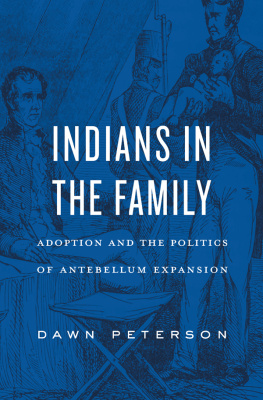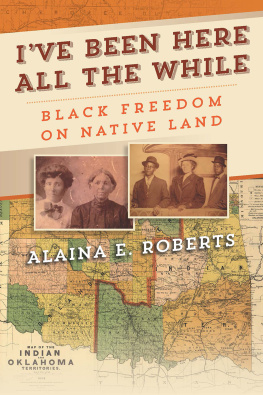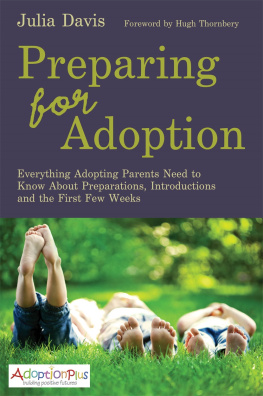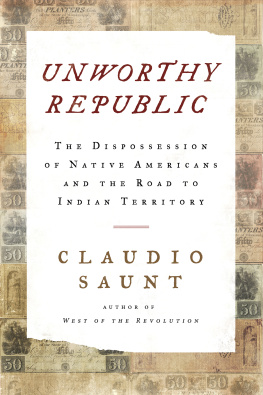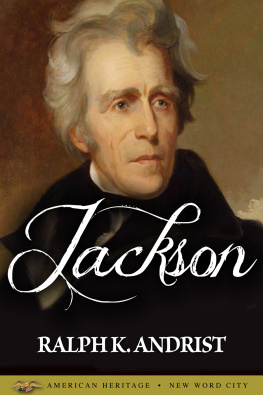Copyright 2017 by the President and Fellows of Harvard College
All rights reserved
Cover image courtesy of the American Antiquarian Society
978-0-674-73755-6 (hardcover : alk. paper)
978-0-674-97874-4 (EPUB)
978-0-674-97873-7 (MOBI)
978-0-674-97872-0 (PDF)
The Library of Congress has cataloged the printed edition as follows:
Names: Peterson, Dawn, 1977 author.
Title: Indians in the family : adoption and the politics of antebellum expansion / Dawn Peterson.
Description: Cambridge, Massachusetts : Harvard University Press, 2017. | Includes bibliographical references and index.
Identifiers: LCCN 2016041940
Subjects: LCSH: Indians of North AmericaCultural assimilationSouthern StatesHistory19th century. | Indians, Treatment ofSouthern StatesHistory19th century. | Indians of North AmericaSouthern StatesPolitics and government19th century. | AdoptionSouthern StatesHistory19th century. | Imperialism. | SlaveholdersSouthern StatesHistory19th century. | Southern StatesPolitics and government17751865. | United StatesPolitics and government.
Classification: LCC E78.S65 P48 2017 | DDC 975.004/97dc23
LC record available at https://lccn.loc.gov/2016041940
IN 1811 A PROMINENT Choctaw woman named Molly McDonald placed her eleven-year-old son in the home of Silas Dinsmoor, an unpopular U.S. government official who had just established a sprawling plantation in her homelands in what is now the state of Mississippi. Dinsmoorwho served as federal liaison between the Choctaw Nation and the U.S. governmentwas openly disdainful of Choctaw people, politics, and sovereignty, viewing his slaveholding household as superior to the household arrangements of the Choctaw communities that surrounded him. Nonetheless, he eagerly incorporated McDonalds son into his family. Why would McDonald and Dinsmoor, whose interests appeared to be at odds, share a stake in McDonalds son?
That question lies at the heart of this book. For as it turns out, the transfer of McDonalds son to Dinsmoors care was not unique. In the decades following the U.S. Revolution, a number of American Indian women and men and elite U.S. whites supported the placement of Native children into white households throughout the existing United States. By the first decades of the nineteenth century, a small group of American Indians in the Southeast from the Choctaw, Creek, and Chickasaw Nations became particularly interested in sending their childrenespecially their sonsto live in slaveholding households in the U.S. South. U.S. slaveholders proved more than eager to oblige, enfolding Indian children into their domestic spaces and the white and black worlds that shaped them.
Most of the children who lived in U.S. homes spent only short periods of time there, receiving educations in English language and literacy skills as well as in numeracy, literature, and Western philosophical and religious traditions. Those incorporated into U.S. plantation households learned other lessons still as they watched white guardians try to assert mastery over the African and African American women, men, and children they enslaved. These U.S.-educated youth then returned to their tribal nationsand their familieswhere many took up prominent leadership positions.
Despite the brief nature of the majority of these domestic arrangements, those who housed and schooled Indian boys and girls understood their actions as a form of adoption. They saw themselves as absorbing Native children into their white familieshowever temporarilyand framed their actions as part of a broader initiative on the part of their new republic to assimilate Indian people into its expanding territorial borders. White adopters took their cue from some of the most influential governing officials of their day. As the United States aggressively pushed into Indian territories east of the Mississippi River between 1790 and 1830, a wide range of governing elites declared the importance of assimilating Indian people into the U.S. body politic, which they described as a free white national family. Rather than emphasizing the various forms of violence required to dispossess Native people of their ancestral territories, government officials turned U.S. imperialism into a family story, one supposedly capacious enough to include American Indian peoplebut not blackswithin white kinship systems, the foundational familial frameworks that shaped the rights of citizenship.
In current times, the term adoption relates to a specific liberal familial and reproductive arrangement whereby an individual or a two-parent couple legally asserts exclusive parentage rights over a child or children who are not immediate offspring.
This books use of the term adoption more flexibly denotes an array of practices focused on the assimilation of Indian youths that were held together by declared desires on the part of U.S. whites to situate Indian people as members of the U.S. body politic. Within this framework, Indian people were supposed to enjoy liberty in the United States, but were also to remain socially and politically subservient to U.S. whites. Unlike people of African descent, whose identities became synonymous with slaverya status that denied black people the very rights or recognition of kinshipIndians were described as free people who could potentially be incorporated into the U.S. national family, a process that in turn mandated that Indians adopt the social, economic, and familial values associated with white U.S. society. Desires to adopt Indians into the United States reflected ambitions to position Indian people as at once on an equal footing to whites yet simultaneously pliable to white demands. Indians were to be assimilated as free children within the white national family, yet they were also supposed to remain permanent youth whose social, political, and intellectual maturity was constantly deferred.
Those who believed they could incorporate Indian people into the United States on their own terms quickly came to confront Native resistance strategies that they had not expected. A number of American Indian communities saw significant utility in placing their children among U.S. whites for schooling. In the North, those whose lands stood in close proximity to U.S. settlements were especially keen on acquiring for both young girls and boys English language and literacy skills as well as a facility in technical artsparticularly spinning, for womenin order to better position themselves economically and politically with respect to their acquisitive white neighbors. Native families placement of young children within U.S. homes was not a sign of their subservience to the United States but quite the opposite. The forms of knowledge their children could obtain in the midst of empire would better allow these youths and their extended families to oppose it.

